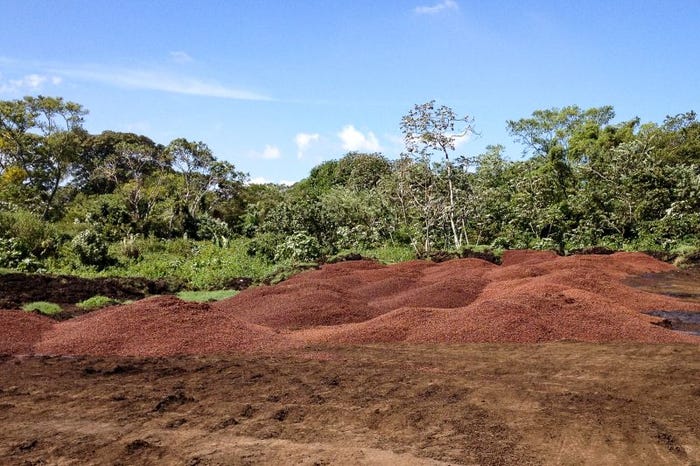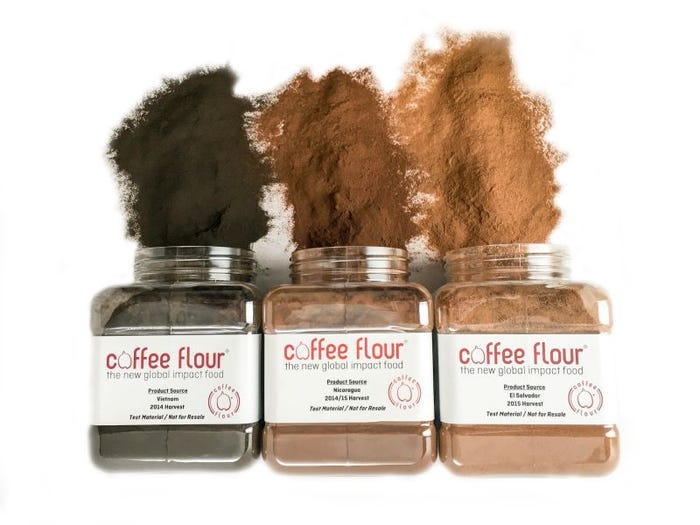Esca Bona Supplier Hero: Coffee Flour
Although coffee is one of the most popular crops in the world, most people are unaware of a troubling byproduct that one company is turning into a versatile functional food ingredient.

Ranked as the second-most widely consumed beverage in the world, Americans regard coffee in a variety of ways. For some, coffee is purely functional, a potion to stay productive after a restless night’s sleep.
For others, coffee is a daily delicacy requiring ritual preparation: Hand-grinding beans. Calibrating the temperature of the water. Timing how long grounds steep. Essentially, an art.
Coffee can even be an avenue of sustainability for shoppers, as purchasing environmentally friendly coffee beans is one easy way to practice responsible buying.
But even the most earth-conscious shoppers likely don’t know that coffee production has a worrying byproduct that not only pollutes streams and rivers, but also creates harmful methane gas that contributes to climate change.
Coffee pulp, the crimson fruit or “cherry” enrobing each coffee bean, creates substantial waste at coffee processing facilities around the world. From Brazil to Nicaragua, after separating the bean from the fruit, coffee pulp accumulates in mountainous proportions. The bean is dried, and later roasted. But as the coffee fruit is difficult to compost and too fibrous for animal feed, the majority is left to rot.

It was this astonishing waste that led former Starbucks employee Dan Belliveau to launch Coffee Flour®, a supply company that transforms landfill-bound coffee fruit into a versatile ingredient for food industry professionals.
“Dan captured the fruit in partnership with the processor at the coffee’s origin, and developed a process to dehydrate the fruit and stabilize it in a food safe manner,” said Carole Widmayer, vice president of marketing and sales at Coffee Flour. “That’s the critical piece to this. Coffee Flour lives up to stringent food safety standards.”
The company then ships the dried coffee pulp to the United States, where it’s milled into three grind sizes ideal for incorporating into baked goods, or blending into finished food or beverage products. Luckily, it’s an easy sell convincing manufacturers to use coffee flour, as it’s packed with fiber—a trending nutrient that many consumers are excited about—and antioxidants, and has a nuanced tart-sweet taste. Most food companies get it. But it’s a formidable challenge to educate consumers on the benefits of the ingredient, how to use it and that it exists at all—a tall order for a still-young brand.
“The name ‘Coffee Flour’ has been a little challenging because people assume it tastes like coffee,” Widmayer said. “But it really tastes more like roasted dates with a hint of citrus. Depending on what country it comes from, sometimes it even has tobacco or tea notes in it, making it amazingly good when paired with warm spices, chocolate or even savory goods such as pizza crust or bagels.” Coffee Flour is also experimenting with the ingredient by blending it into sauces that would work well with proteins, as it helps sauce stick to meat, fish, poultry and vegetables, and blends well with umami flavors.
Manufacturer Adoption
One of the first brands to use Coffee Flour was Seattle Chocolate, which included it in cocoa-infused bars and bites. Another early partner was Google—the tech giant incorporates the ingredient in some baked goods in its offices across the United States. 
For Dan Kurzrock, founder of ReGrained, a natural brand that bakes “spent grain” (grain left over from the beer brewing process) from local breweries into nutrition bars, Coffee Flour seemed like a prime ingredient partner. “Our whole business at ReGrained is built around being a platform for edible upcycling. We’re obsessed with products that come from ingredients of overused waste streams,” Kurzrock said. “It was a no-brainer for us to incorporate Coffee Flour’s ingredient into our product. It serves as an educational opportunity for our customers. Nearly everyone drinks coffee, but not everyone knows there’s a coffee fruit that’s left behind from that process.”
Aside from the environmental benefits associated with diverting a usable food from the landfill, Kurzrock was also motivated to bake Coffee Flour into his bar because the ingredient provides social benefits to coffee farmers involved in the supply chain. Widmayer said by paying farmers for the fruit they’ve always picked but never had value, Coffee Flour boosts their annual revenue between 10 and 20 percent—a notable increase given that most of the coffee fruit comes from Nicaragua and Guatemala, where opportunities to make more money in rural areas are slim.
Additionally, as the coffee fruit must be dehydrated at the country of origin (the fruit is quite delicate, and doesn’t survive shipping internationally), new jobs are being created at the mills. “For the first time, many of these jobs are open to women,” said Widmayer, who explained that because bags of dehydrated fruit weigh significantly less than bags of coffee beans (which typically weigh 132 pounds each), they are more accessible to women.
The folks at Coffee Flour are driven to make their product a common ingredient in the global food supply chain because of its tangible social and environmental benefits. “Our goal is to have coffee flour in as many products out there,” Widmayer said. “Because the more we’re in use, the more we’re able to pull out of fields and streams and the more jobs we can create.”
Editor’s Note: The Esca Bona Supplier Heroes is a recurring feature of suppliers that fuel innovation in the good food supply chain. These features explore the brand story, innovation, supply chain investment, research and partnerships that these companies undertake to improve the food system and consumer health. We select suppliers based on their commitment to the good food movement, their story, their sustainability initiatives, their focus on safe and efficacious ingredients, and their partnerships with their finished product customers.
Esca Bona is an event and brand spearheaded by New Hope Network that champions the good food movement by helping finished product brands improve their supply chain, support the people who create food, and best harness technology and innovation.
If you know of—or are—a supplier with a story to tell, email Sandy Almendarez, editor in chief, Natural Products INSIDER at [email protected].
About the Author
You May Also Like

